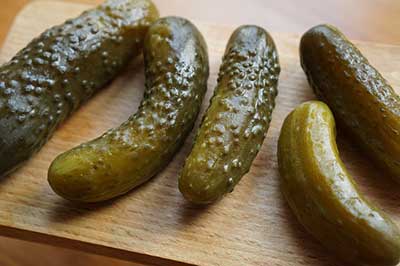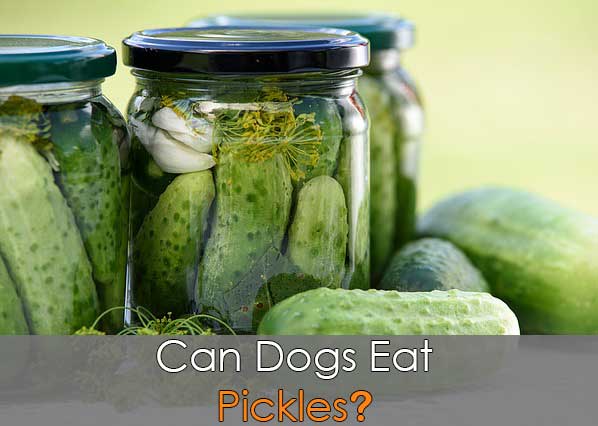Pickles are an odd little treat in the canine world. There are some pups that won’t go anywhere near them because of the sour taste and the strange flavors. Then there are others than can’t get enough of them.
In some ways, they aren’t too dissimilar from humans with this “love it or hate it” relationship. However, we all know that the nicest treats aren’t always good for us.
Pickles are something of a great area for many owners that aren’t too sure about the healthiest diet for their dog. On the one hand, they are a vegetable. On the other, they are processed. So, can dogs eat pickles in a healthy manner?
Table of Contents
Are pickles good for dogs in any circumstance at all, or are they best avoided at all costs?
In this guide we will take a closer look at the question of can dogs have pickles by breaking this food down into its component parts and key issues.
As you will see, this isn’t so much about the vegetable within the pickle, but the elements that turn that vegetable into a pickle. When we create a pickle, we transform the humble cucumber, or other vegetable, into something that barely represents its original form. This is achieved via the pickling juices and a number of additives. Therefore, we need to pay close attention to those components.
We will also look at the issue of can dogs eat dill, because of the popularity of the dill pickle, before drawing a final conclusion on the safety of this “treat”.
If a pickle is a vegetable, surely they are perfectly safe for our canine pals, no?
This is an argument that you will hear from a lot of dog owners. They are not giving their pet the more traditional, artificial treats that they feel are dangerous. Instead this is a real vegetable with health benefits.
[thrive_text_block color=”note” headline=””]Dog owners that want to give pets some added vitamins and minerals may look upon the pickle as a great, simple source. They can slice it up, put it in the fridge and give their pup a piece now and then.On that note, it is important to point out that slicing and chopping pickles really is the only way to feed them to your dog. Some may choke on whole pickles and such a high quantity could be dangerous. [/thrive_text_block]
The truth here is that this isn’t your typical vegetable any more.
This viewpoint above is understandable because of the origin of the pickle. If we are encouraged to feed dogs the right types of fruit and veg, and the cucumber is safe, why not go for a pickle.
[thrive_text_block color=”blue” headline=””]The answer lies in the fact that this new treat is so far removed from the cucumber in terms of taste, form and nutritional value. Many of the best vitamins and minerals have been lost in the process and they are replaced with different agents, additives and preservatives.The biggest issue when considering the question of are pickles safe for dogs lies within the pickling liquid. This is where all the unhealthy components come into play.
A pickle is never just a pickle, which means that it pays for owners to take the time to read all of the ingredients on the label on the jar. You may be surprised at precisely what goes into the pickles in terms of sugar, salt, spices and preservatives. Then there is all that acidic vinegar in the brine. Add this all together and this can be a bit of a dangerous cocktail.[/thrive_text_block]
Are pickles bad for dogs with all that salt, sugar and added flavor?
Any form of pickle – or any other treat for that matter – that is high in salt, sugar, spice or artificial elements is questionable for a dog’s diet.
[thrive_text_block color=”note” headline=””]Where possible, it is best to go down the entirely natural route with the diet. The problem of sugar is quite simple. We all know how easy it is for dogs to put on weight and deal with health issues when there is too much sugar in their diets.The amount in one pickle may seem minimal, but it often depends upon the solution it has been sitting in and the brand.
Also, it is easy to lose track of how many sweet treats you give to your pet. The problem of salt can be just as extreme, as sodium levels need to be kept under control to avoid major health conditions like high blood pressure and heart disease.[/thrive_text_block]
Any dog that is on a low-sodium diet should avoid pickles at all costs because it is unclear how much sodium may be ingested.
Finally there is the problem of spice. Again, different brands will add different elements to the pickle to add to the flavor. There is the chance that some animals may have an allergic reaction.
This leads us onto another question that we see a lot when it comes to the issue of dogs and pickles: can dogs eat dill pickles?
You will see many dog owners questioning the risk of dill pickles specifically.
This is for two simple reasons. First of all, dill pickles are a popular household treat and perhaps more readily available to give to dogs. Secondly, there are many stories about the health benefits of dill for dogs, which confuses those that wonder is dill bad for dogs?
[thrive_text_block color=”red” headline=””]The problems with dill pickles still lie with the pickling solution and sodium content rather than the dill. It is true that dill is great for dogs in the right form because it acts as an antioxidant, freshens breath and helps with digestion.However, this is best used in a small dosage in its natural form. There is little benefit from the dill in a pickle. [/thrive_text_block]

What is the best approach here if you have a dog that likes pickles?
Some dog owners with pickle-loving dogs will look at this advice and see that moderation may be the potential solution here.
All owners have to be careful with the quantities of pickles and the size of the portions if they don’t want to deprive the animal entirely.
[thrive_text_block color=”note” headline=””]One solution may be to look for pickle producers with pickles that are deliberately low-sodium, low-sugar and low in additives. Those that decide that pickles really are too dangerous will have to give them up entirely. [/thrive_text_block]Don’t forget to look at nutritional guides for the best advice
So far in this guide we have stressed the importance of a balanced diet for dogs – one that works with careful portion sizes, natural ingredients and control over treats. The odd pickle may fit into the right diet with the right approach. This is where a guide such as the Dog Food Secrets e-book can really help anyone that is struggling with treats and portion control. It provides helpful, easy-to-follow advice on healthy, nutritious meal plans for our pets.
The issue of portion size also brings up another important point about the quantities of pickle and the types that can be given to our dogs.
[thrive_text_block color=”red” headline=””]We have to remember that different dogs have different needs and digestive capabilities. What may be a safe amount of sodium per dog for a Labrador won’t be the same for a Chihuahua.
Therefore, it is often much safer to give these pickle slices to larger breeds than smaller breeds. That is of course unless there is some pre-existing medical condition that rules out any of the component. [/thrive_text_block]
[pullquote align=”normal”]With larger breeds, it is best to be cautious. With small breeds, it is best to avoid the pickles entirely. [/pullquote]Why not try other vegetables or a real cucumber?
The final factor to consider with the issue of are pickles OK for dogs takes us back to that idea of this being a cucumber.
[thrive_text_block color=”note” headline=””]If dog owners don’t want to stop feeding their dogs pickles because of the health benefits and nutritional content of the vegetable, it really is best to use the vegetable as it is. The less that we mess about with these safe fruits and vegetables, the more nutritious and beneficial they are.There are more antioxidants, vitamins and fiber in a raw cucumber – although it may not taste as nice.[/thrive_text_block]
Owners should also remember that they need to avoid any pickles that may have been cooked with, or prepared with onion. Onion is especially dangerous to dogs as it can cause anemia.
In summary, can dogs eat pickles, or are they best left alone?
As you can see, there are times when the odd pickle may be allowed into a diet. Owners that are careful with their pickle-buying habits, avoid those overly spicy dill pickles and stay away from anything too rich in sugar and salt may get away with the odd treat.
A slice of gherkin from a burger now and then wont do an awful lot of harm. However, regular treats of whole pickles and brine soaked pieces could be a disaster. The best approach is to avoid them entirely and stick to the real vegetable for the best nutritional content and for safety.


